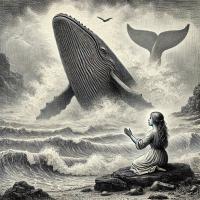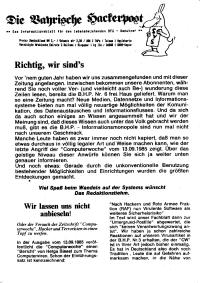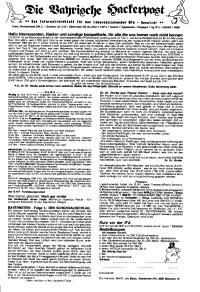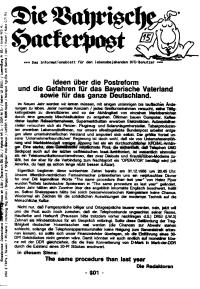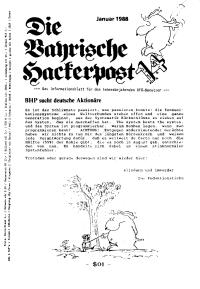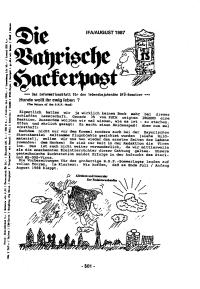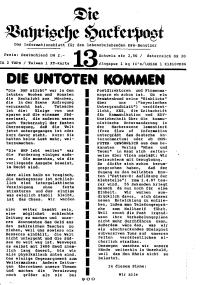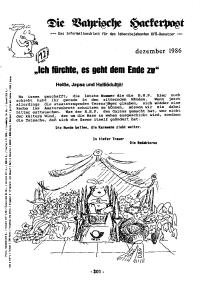Copy Link
Add to Bookmark
Report
OtherRealms Issue 14 Part 02

Electronic OtherRealms #14
April, 1987
Part 2
Pico Reviews
Artifact by Gregory Benford [***]
Tor (1985), 520 pages, US $3.95.
This is really a suspense/adventure story with a hard SF McGuffin
(i.e., the thing that all the characters are trying to get hold of).
It reminded me in several ways of novels by Elizabeth Peters, which I
consider a quite favorable remark. It also reminded me of a
screenplay; the more SFish scenes are sometimes dominated by very
visual descriptions. It begins at an American archeological dig in
Greece, with the threat of a coup by military people who are anti-
American, and one of whom is personally hostile to the archeologists.
Something remarkable is discovered, and the lead characters try to keep
it away from the Greeks. But they don't know how much their chief
opponent wants it, nor quite how remarkable it is...
-- Mark Brader
decwrl!utcsri!sq.com!msb
The Ballad of Halo Jones Book 3 by Alan Moore and Ian Gibson [****]
Titan Books 4.95 pounds
This is a bound reprint of the Halo Jones stories that first appeared
in the British comic 2000AD, a comic which usually concentrates on
mega-death and violence. It comes as a great surprise then to see a
perfectly normal girl emerging as the comics 2nd most popular strip.
Alan Moore's characterisation of a young girl caught up in a horrific
war in which she isn't even on the 'right' side is superb and
compelling, Gibson's artwork is beautiful (Halo has to be just about
the most attractive heroine in comics at the moment) and, although some
of the science is dodgy it doesn't really matter. If you still think
comics are for kids give this a go and you will be pleasantly surprised.
-- Piers Cawley
pdc@UK.AC.Nott.Cs
The Book of Ellison by Andrew Porter [****]
Algol Press, P.O. box 4175, New York, NY 10017
This book is an examination of Harlan Ellison; the man, the author,
and the words. A third of the book are essays by people like David
Gerrold, Robert Silverberg, and Ted White about Ellison. The final
two thirds are essays on various subjects by Harlan Ellison. If
you're a fan of Ellison, this book is a must have, as it will let you
read them with a new perspective. I've been a long-time fan of
Ellison, and I thought I knew his works pretty well. I was surprised
how much I'd missed until I read this work.
-- chuq von rospach
The Cat Who Walks through Walls by Robert Heinlein [***+]
Berkley Books, $3.95, 1986, 388 pages
It starts off innocently enough, with a bang. And after that, it goes
everywhere in just over two days (a la Number of the Beast), and
winds up tying in to the rest of Heinlein's multi-verse (as does
everything he writes). Heinlein writings, much as I enjoy reading
them, have gone to the author's head (look at the dedication of this
book to see what I mean). Does everything have to tie into
everything else? And if so, does that tie in have to happen so
abrubtly, right in the middle of all that great action that Heinlein
writes so well? Grrr... Still, I'll keep buying 'em, if for the first 3/4
of the book, before all the old characters come in and spoil everything.
--Peter Korn
Comet Halley by Fred Hoyle [***+]
A hard SF novel, with mystery/suspense overtones, from a famous
astronomer. It's Hoyle's 4th novel on his own, the first such in some
years; his solo works are quite different from his collaborative
juvenile stories. I found the characters charming -- the principal
setting is Cambridge University, and British humor is liberally
sprinkled. The story gets going with a "first contact" radio message --
which seems to originate from a comet! Later, two-way communication
with the source is established, and then...
-- Mark Brader
decwrl!utcsri!sq.com!msb
The Cyborg and the Sorcerers by Lawrence Watt-Evans [***-]
Del Rey
The Cyborg and the Sorcerers is "Space Opera meets Fantasy in the
Aftermath;" fortunately, that's not as bad as it sounds. A
cyberneticized human (termed Slant) and his computer are scouts for
Old Earth in the revolution of the space colonies. Despite the fact
that Earth lost the war some three hundred years ago, the computer
is programmed to blow the Slant up should he attempt to "fraternize
with the enemy" until such time as it receives a release code. Of
course, the computer defines any colonial inhabitant as an enemy,
especially the wizards who seem to have developed a "new weapon"
that might be used against Earth. The focus is on the relationship
between Slant and the computer, and the problems that arise;
therefore, the descriptions are sometimes lengthy, but they do
manage not to be too intrusive.
--Lisa Besnett
A Darkness at Sethanon by Raymond Feist [***+]
The concluding volume in the Riftwar Saga, this book continues the
fine storytelling begun in the earlier volumes. While the first book
was truly brilliant, and the rest merely fine, they suffer only by
comparison. In this book, the individuals, already excellently
developed all manage to behave in character, even those about whom
major background changes are revealed. Raymond Feist has not
succumbed to the temptation to leave plotlines dangling in order to
extend the books into an open-ended series. While a continuation
with different story lines would not be inconceivable, all the
plotlines introduced in the current volumes are satisfactorily
resolved. Together with the first three books, this is one of the best
fantasy stories of recent years.
-- Peter Rubinstein
Isaac Asimov's Wonderful Worlds of Science Fiction #6: Neanderthals
edited by Robert Silverberg, Martin H. Greenberg,
and Charles G. Waugh [***]
Signet books, $3.95
Another anthology from the prolific pair of Greenberg and Waugh, the
theme this time is the Neanderthal in its varying forms, as different
authors, from H. Beam Piper to Thomas Easton, from L. Sprague de
Camp to Philip Jose Farmer look at this subhuman in various forms.
Like most them anthologies, all of the stories are reprints (ranging
from 1939 to 1981) and are useful for helping readers collect
stories that haven't been widely anthologied in the past. Unlike
some anthologies, this doesn't contain a bibliography, which I like to
see since it helps me use the anthologists research in finding things
that didn't fit in the book.
-- chuq von rospach
The Kundalini Equation by Steven Barnes [****]
Tor Books, $3.50, 1986, 347 pages
Steven Barnes likes the martial arts. And anybody can learn these
martial arts; just don't take things too far... Good characterization,
though the plot was pushing it just a bit on the self-consistency side.
--Peter Korn
korn@ucbvax.berkeley.edu
Masque World, The Thurb Revolution, & StarWell by Alexei Panshin [***]
Ace Books, $1.75 ea, 1978
The story of our hero, Anthony Villers, both with, and without his
moustache, both with and without verious and sundry young women,
and almost always with Torve the Trog. Unlike any other SF I've
encountered. Very interesting; yah, that's it, interesting. Make sure
that you have all three books before you start reading them; they are
out of print.
--Peter Korn
The Maze of Peril by John Eric Holmes [**]
Space and Time, 138 West 70th Street (4B), New York, NY 10023, $6.95
Author John Eric Holmes merges a dungeon of a Fantasy Role Playing
game into a Fantasy adventure. We follow the magicians, fighters,
dwarves, elves, and associated nasties through a desolate
underground arena in search of adventure (plenty) and gold. At times
this book reads more like an FRP dungeon than a novel, but overall
he's done a good job of taking a role playing adventure and fleshing it
out into a full novel. This book will probably be of interest mainly
to the readers who also game.
-- chuq von rospach
Night's Master by Tanith Lee [****]
Tanith Lee is a master of the heroic fantasy epic; she writes in the
style of legend and myth. Her use of language is exquisite; her
descriptions are magical. She paints with words and captures the
emotion and power of a magical era. This books tells three stories
about Azhrarn, Prince of Demons and the heroic and tragic lives of
the mortals whose fates were intertwined with him. This is adult
fantasy; some scenes may offend the prudish, but passion is
essential to true legend. If you want to read of imagination and
dreams, read this.
--Brett Slocum
An Old Friend of the Family by Fred Saberhagen [***+]
Tor Books, $3.50, 247 pages.
In the late 70's, Saberhagen retold the Stoker Dracula story from the
point of view of the vampire in The Dracula Tapes. This book
continues that series starring Dracula as a sympathetic character.
A good book, but not as good as the first book, which I hope also gets
reprinted soon.
-- chuq von rospach
On the Good Ship Enterprise by Bjo Trimble [****]
Starblaze, $6.95, 1983, 286 pages
Stories of and about Star Trek, it's characters, and fans; all
revolving around Bjo Trimble's personal experiences. Divided into
eight parts (such as "Revolving Fans", "Very Con-ventional", and
"Star Trek--The Montion Pictures"), it is one of those "musts" for
fans of Star Trek. Very funny too.
--Peter Korn
korn@ucbvax.berkeley.edu
On the Good Ship Enterprise by Bjo Trimble [****]
Starblaze Editions, 1986, 286 pages, $7.95 trade paperback
This is a memoir of the days of Star Trek from the den-mother of
Star Trek Fandom, Bjo Trimble. Bjo (pronounced bee-joe) has been
involved in Star Trek since the very beginning, put together the
million letter Save Star Trek campaign that brought it back for a
third season, helped set up Lincoln Enterprises (the fan-letter
answering and memorabilia company for Star Trek), put on
conventions and generally acted as cheerleader for the Star Trek
fans nationwide. This is a very personal account of those years.
Unlike David Gerrold's books about Star Trek, this book is definitely
about Bjo, and about the things that went on around her. It does not
drop down into egotism -- I've been lucky enough to meet Bjo at a
couple of conventions, and a nicer women you will never meet, a
feeling that shows up throughout the book. Star Trek fans will love
this. I think it gives a flavor and a perspective on the movement
that you don't get anywhere else, and there is a lot of fun times here.
-- chuq von rospach
Our Lady of Darkness Fritz Leiber [****]
Ace Books, $2.50, 1984, 183 pages
A Supernatural horror story that takes place in San Francisco.
Reminds me of Ghostbusters, kinda sorta in a wierd way. San
Francisco foggy nights will never be quite the same anymore.
--Peter Korn
The Postman by David Brin [****]
Bantam Books, $4.95, 1985, 321pages
Damn fine read. My only complaint is that Brin doesn't tell us enough
of the story (or he tells us too much). But to leave us where he did
just isn't right; otherwise it's a great book.
--Peter Korn
Retief at Large by Keith Laumer [****]
If you like the idea of a diplomat who ignores all his superiors and
just does things, managing to have everything work out ideally while
everyone else fumbles about, you'll love Retief. He's a sort of inter-
gallactic rogue, working for the implacable CDT (Corps Diplomatique'
Terrestrienne) and his almost permanent boss Ambassador Magnan.
This is a really fun anthology of Retief stories!
-- Dave Taylor
hplabs!taylor
The River of Time by David Brin [****]
Bantam Spectra, $3.50, 1987, 295 pages
Short stories written over the course of Brin's writing career. "The
Crystal Spheres" is my favorite (pictured on the cover). Brin has
divided the book into sections: Destiny, Recollection, Speculation,
and Propagation; the stories in Destiny are worth the price of the
book; the rest is of lesser calibre (especially "Roujours Voir", the
250 word story).
--Peter Korn
korn@ucbvax.berkeley.edu
Roger Zelazny by Theodore Krulik [*]
The Ungar Publishing Company, $15.95, 178 pages
I've been waiting for a good book on Zelazny, both the man and his
writing, for quite some time. After reading Krulik's book, I'm still
waiting. In the notes preceding the bibliography, Krulik lists six
personal interviews with Zelazny as being among the sources for his
book. Yet repeatedly the most interesting quotes are from other
sources, notably Zelazny's remarks in two of his anthologies, The
Last Defender of Camelot and Unicorn Variations. The result is that
there is little new material from Zelazny himself and his personal
background is rendered in a shallow and superficial manner, leaving
little feel for Zelazny himself and how significant events in his life
have affected his writing. Krulik's analysis of Zelazny's work fares
no better. Works are gathered together for examination in thematic
groups; the result is no better than a collection of sophomoric book
reports attempting to compare and contrast. Give this book a pass
unless you're a Zelazny completist.
-- Jim Brunet
hplabs!hao!ico!ism780B!jimb
A Stainless Steel Rat is Born by Harry Harrison [****]
Bantam Spectra, $2.95, 1985, 219 pages
The true story of Slippery Slim diGriz started his infamous career,
and Harrison doesn't let us Stainless Steel Rat fans down. More,
hear me Harry? I want more.
--Peter Korn
Star Trek IV, the Voyage Home by Vonda McIntyre, based on the movie [****]
Pocket Books, $3.95, 1986, 274 pages
To be read only after seeing the movie. Learn why the thing comes
to Earth, and gain insights into the real reason that Scotty tells the
things he tells the the person he tells it to reguarding a certain type
of aluminum.
--Peter Korn
Steel Brother by Gordon R. Dickson [***]
Tor SF, 236 pages.
This is an interesting anthology of early stories (for the most part)
from Gordon R. Dickson. "Out of the Darkness" is a wry mystery story
of a man in a lighthouse, "The Man in the Mailbag" and "Steel Brother"
are both interesting lead-ins to the sometimes-excellent later Dorsai
series (aka the Childe Cycle), "Perfectly Adjusted" is a fine,
humourous tale of a society where people are heavily conditioned
against seeing each other, and "The Hard Way" is a nicely crafted tale
of a society that lands on Earth to figure out if they can invade it or
not... With the exception of the last two, I'd say this is one of the
finest anthologies I've ever read. The last two 'stories', however,
are both gratuitous nonsense that don't belong in the book at all. The
first is "The Childe Cycle Status Report" where Dickson discusses where
the ideas for the Childe Cycle came from, how he plans on approaching
the entire storyline, etc. The second is "A Conversation with Gordon
R. Dickson" by Sandra Miesel. I'm not averse to these existing,
understand, I just don't think they are appropriate for the anthology
of fiction stories that they are almost a fourth of. Seems like
self-indulgence to me...
-- Dave Taylor
hplabs!taylor
The Tao of Pooh by Benjamin Hoff [****]
Penguin, $4.95, 158 pages
This is not only a cute book, but it really is quite thought provoking
- there really is quite a bit of the Taoist philosophy and ideas in
A.A.Milne's childrens story "Winnie the Pooh". As the back cover says
"While Eeyore frets...and Piglet hesitates...and Rabbit calculates...and
Owl pontificates...Pooh just is, and that's a clue to the secret
wisdom of the Taoists.". Very enjoyable.
-- Dave Taylor
hplabs!taylor
Thieves' World Graphics #4 by Robert Asprin and Lynn Abbey [**]
Starblaze Graphic, b&w graphic novel, $3.95. Art by Tim Sale.
The latest in the Black and White Graphic novel version of the
Thieves' World story. If you've read the Thieves' World books, the
story is familiar, as the Graphic Novel simply retells the books in
visual form. Sale's art is, as usual, quite good, and the B&W format
works much better for Thieves' World than the recently issued color,
but I wasn't impressed with the story as much as in previous volumes.
-- chuq von rospach
Ubik by Philip K. Dick [***]
Dell SF 1970
How can one adaquately describe a Philip Dick book. He is one of the
most unusual authors in the genre. His descriptions are top-notch,
and his plots are unique, to say the least. In Ubik, Joe Chip is a
tester for a company that protects people from psionics by
employing 'inertials,' those with an anti-psionic talent. After his
boss dies, Joe's 1990's reality seems to be decaying into 1939, piece
by piece. And someone is killing off all the inertials. And Joe had
better find some Ubik or he'll be next. The style is straightforward;
just the events are confusing. Definately a fuse-blower.
--Brett Slocum
The Witling by Vernor Vinge [***]
1976, Daw 173pp.
This is reasonably standard adventure science fiction. It doesn't
reach the level of Vinge's recently reissued True Names, but is well
written none-the-less. The story concerns some space-faring
anthropologists who are marooned on a seemingly backwards planet.
The twist is that the natives have evolved various psychic powers
and so have never had a need for technology. Our anthropologists
have to think their way out, and their recognition of the
conservation laws the powers obey gives them a small advantage
over the scientifically naive natives.
--Chris Hibbert
Hibbert.pa@Xerox.COM
Wizard of Pigeons by Megan Lindholm [****-]
Ace Fantasy 0-441089467-4 2.95
I normally hate protagonists that are self-defeating, like the
protagonist of the Covenant series, and the protagonist of this book;
however, in both cases, I can see good writing. This is good writing,
with images and people as strong and clear as reality. There are many
moments in this book that haunt, vividly, and the basis for the magic
in the lives of the main characters is almost a frightening one. The
plot is simple, one of the magic people in Seattle must confront his
personal nemesis, and this tells how. The adventure is through his
life, not only the particular here and now of the confrontation, and it
is a fascinating one. There is one feature of this book that one
should be aware of, and that is it is set in Seattle in intricate
detail, from the mapping of her streets to the attitude of the natives
to all the amazing jumble of historic fact that Seattle has accumulated.
--Liralen Li
OtherRealms #14
April, 1987
Copyright 1987
by Chuq Von Rospach.
All Rights Reserved.
One time rights have been acquired from the contributors.
All rights are hereby assigned to the contributors
OtherRealms may be reproduced in its entirety only for
non-commercial purposes. With the exception of excerpts
used for promotional purposes, no part of OtherRealms
may be re-published without permission.
OtherRealms is published monthly through July, then quarterly by:
Chuq Von Rospach
35111-F Newark Blvd.
Suite 255
Newark, CA. 94560
usenet: chuq@sun.COM
Delphi: CHUQ
Review copies should be sent to this address for consideration.











